- Home
- Maya Angelou
All God's Children Need Traveling Shoes Page 3
All God's Children Need Traveling Shoes Read online
Page 3
The African woman was screaming, “You peepo, you got your Black Star Square. You got your university, but you got no rye! You peepo!” She began to laugh sarcastically, “You make me laugh. Pitiful peepo. Pitiful. No rye, no pride. Ha, ha. See me, Sierra Leone woman, laugh. Ha, ha. Ha, ha!”
I went through the private doors into the kitchen. The cook was sitting on a stool drinking a soda. I said, “Uncle, please excuse me.” He looked up frowning, apparently expecting one more complaint.
“Uncle, there is a woman out there who is dying for rice.”
He shook his head. “Rice tonight. For dinner. Rice tonight.”
I said in a sweet voice, “Oh please, Uncle. She must have rice. Please.”
He said, “She must wait, or go somewhere else. Rice tonight.”
I was defeated. I turned to leave, then turned back. “The woman will go back to her home thinking Ghanaians are mean.”
“Let her go. Rice tonight! Anyway, where is she from?” He wasn’t really interested. I had my hand on the door. I said, “Sierra Leone.”
The cook jumped off the stool. “Why didn’t you say that? You said ‘a woman.’ I thought you meant a Black American. Sierra Leone people can’t live without rice. They are like people from Liberia. They die for rice. I will bring her some.”
The woman was still standing and talking to the air, although weakly, when the cook passed through the dining room bearing a large platter of rice. He placed it on the woman’s table without a word, and she sat down speechless, her eyes hungrily counting the white grains.
When the cook reached the kitchen door the room exploded in applause.
The University of Ghana with its white buildings and red tiled roofs loomed like a chimera atop Legon’s green hills. The Moroccan architecture of arches, wide, low steps and loggia gave the institution an unusually inviting warmth. African students and faculty paraded the halls and grounds in distinctive and often colorful outfits.
Women often wore short cotton skirts and blouses or the richly patterned long national dress, consisting of provocatively cut peplum blouses and long, tight skirts meant to accent small waists and abundant hips.
Some men wore the northern territory woven smocks which were highlighted with bright embroidery, while some others favored Western slacks and short sleeved shirts. Moslems from Nigeria or Cameroon wore the Grand Bou Bou: twelve yards of fine cotton fashioned into pants, shirts and a matching floor length over-smock. Despite the hot weather there were a few African professors who elected to wear the Cambridge or Oxford school gowns over woolen pants, buttoned down shirts and ties. Some wore Nehru jackets made popular by President Nkrumah. It was not surprising to see a lecturer in national dress on Monday, a casual smock and slacks on Tuesday, and worsted tweed on Wednesday. Ghana’s colorful cloth was sold in every marketplace, so status could not be determined by clothes. Thus the market woman, the bank teller and the student might wear the same pattern on any morning and nothing was thought of the coincidence. A fragrance of flowers permeated that riot of color, sound and activity provoking all the senses into constant exercise.
My office door opened onto a grassy courtyard and the windows looked out onto a dance pavilion. Students, faculty, tradesmen, market women selling roasted peanuts and plaintain, visitors and administrators were in constant view. Astonishingly, in that strain of energy projects were designed and work was completed.
Efua wrote and directed plays. The handsome Joe de Graft taught acting, and occasionally graced the stage with a quite heroic presence. Bertie Okpoku and Grace Nuamah taught the traditional dances of the Ashanti, Ewe, and Ga people. Professor Nketia, with disarming gentleness, controlled all the artistic temperaments while teaching music, music theory, music history, and African musicology.
I worked wherever I was needed. Professor wrote Kple, Music of the Gods, a book on the liturgy of the Ewe, and despite my scanty knowledge of typewriters, I was asked to type the manuscript, and did so. Reports on students’ development, their absences and illnesses were kept in my files. Sometimes I handled theatre reservations or sold tickets at the box office in town. When Ireland’s Abbey Theatre director, Bryd Lynch, came to teach at Legon, she chose to present Bertolt Brecht’s Mother Courage in full production, and I was chosen to play the title role.
My son was growing into manhood on the university campus, under my eye, but not my thumb. Ana Livia and Julian, Efua and her children, my housemates and our lusty friends provided recreation enough. At last life was getting itself in joint.
Vicki, Alice and I had decided to share a house, and the pretty white bungalow we found was a proud prize. There were three bedrooms (Vicki characteristically offered to take the smallest), a commodious living room and dining room. The kitchen was a disappointment to me, but my housemates, who claimed no interest in cooking, hardly noticed its meagre appointments.
Vicki Garvin was a pretty little yellow woman, always immaculately groomed with tiny, graceful hands. She had been a national union organizer in the United States and was highly respected in American and European labor circles, and had come to Africa in the legion of hopeful returnees. She was strong-nerved, but years of unsuccessful bargaining with American bosses and reluctant workers had left cynicism in her voice and her face was quick to adopt a shadow. She had a Bachelor’s degree in English, a Master’s degree in economics and years of experience.
She had gone first to Nigeria, but after a bitter reception, or rather, a bitter rejection, had been encouraged to believe that she would easily find creative work in the progressive country of Ghana.
For months she carried her qualifications as burnt offerings to labor and trade union offices, and when not ignored outright she was told “the big man,” meaning the boss, “is travelling. Come again.” When Vicki did find work it was as a typist in a foreign embassy. She refused rancor, saying that right now “Ghana needs its jobs for Ghanaians, but someday….”
Alice Windom, the youngest in the bungalow, was also the most explosive. She was a dark mahogany color, had a wide open smile and the prettiest legs in Accra. Men used to sit in our living room, oblivious to the exquisite conversation of three bright women, too busy ogling and loving Alice’s legs. Alice had degrees from an Ohio university and a Master’s from the prestigious University of Chicago. Her argumentative talents, so recently exercised in the school environments, were as pointed as broken bones.
She had come from a family of university professors, and had debated with her siblings for dominance. Neither visitors nor the other bungalow inhabitants could best her in verbal contests. During her last school years, she had vowed to save her money and come to Ghana to live forever. Her field was sociology and her dream was to belong to a community of African social workers. She searched in associations and congresses and committees, but her diligence went unrewarded. Alice became a receptionist in a foreign embassy.
As was expected, Alice was not as casual as Vicki on being denied a chance to work in her field of interest. “Damn, these Africans in personnel are treating me like Charlie did down on the plantation.” There was never a suggestion that she might leave Ghana for greener pastures.
It was agreed in the house that as far as work was concerned, I was the most fortunate. As administrative assistant at the University of Ghana, I had direct contact with African students, faculty, administrators and small traders. While the job was a blessing, the pay was not bounteous.
I received no housing, tuition, or dislocation allowances. On the first day of every month, when the small manilla envelopes of cash were delivered to the offices, I would open mine with a confusion of sensations. Seventy-five pounds. Around two hundred dollars. In San Francisco, my mother spent that amount on two pairs of shoes. Then I would think, seventy-five pounds, what luck! Many Ghanaians at the university would take home half that much with gratitude. My feelings slid like mercury. Seventy-five pounds. Sheer discrimination. The old British philosopher’s packet was crammed with four times that, and all I
ever saw him do was sit in the Lecturers’ Lounge ordering Guinness stout and dribbling on about Locke and Lord Acton and the British Commonwealth.
I would count out the paper money, loving the Black president’s picture. Thirty pounds for rent; thirty for my son’s tuition, being paid on the installment plan; ten for beer, cigarettes, food. Another five for the houseman who my friends and I paid fifteen pounds per month to clean the bungalow.
A grown man could live on fifteen pounds, and there I was being a simpering ass. I was my mother’s daughter. When I left her house at seventeen, she had said, “I’m not worried about you. You’ll do your best, and you might succeed. And remember, as long as you’re making a living for yourself you can take care of your baby. It’s no trouble to pack double.” All I had to do was find extra work.
The editor’s office of the Ghanaian Times had all the excitement of a busy city intersection. People came, left, talked, shouted, laid down papers, picked up packages, spoke English, Fanti, Twi, Ga and Pidgin on the telephone or to each other.
T. D. Kwesi Bafoo perched behind his desk as if it was the starting mark for a one hundred yard sprint. At a signal he would leap up and hurl himself past me, through the crowded room and out of the door.
His cheeks, brows, eyes and hands moved even before he talked.
I said, “I am a journalist. I’ve brought some examples of my work. These are from the Arab Observer in Cairo.” He waved away my folder and said, “We know who you are. A good writer, and that you are a Nkrumaist.” I was certainly the latter and not yet the former.
As he stuffed papers into a briefcase he asked, “Can you write a piece on America today?”
“Today? Do you mean right now?”
He looked at me and grinned, “No. America today. America, capitalism and racial prejudice.”
“In one article?” I didn’t want him to know the request was implausible.
He said, “A sort of overview. You understand?”
I asked, seriously, “How many words, three thousand?”
He answered without looking at me, “Three hundred. Just the high points.”
The seething energy would no longer be contained. Bafoo was on his feet and around the desk before I could rise.
“We’ll pay you the standard fee. Have it here by Friday. I have another meeting. Pleasure meeting you. Good-bye.”
He passed and disappeared through the door before I had gathered my purse and briefcase. I imagined him running up to the next appointment, arriving there in a heat, simmering during the meeting, then racing away to the next, and on and on. The picture of Mr. Bafoo so entertained me that I was outside on the street before the realization came to me that I had another job which paid “the standard fee.” I was earning that at the university. In order to afford luxuries I had to look further.
The Ghana Broadcasting office was as to the Times newspaper office what a drawing room was to a dance hall. The lobby was large, well furnished and quiet. A receptionist, pretty and dressed in western clothes, looked at me so quizzically, I thought perhaps she knew something I needed to know.
She frowned, wrinkling her careful loveliness. “Yes? You want to talk to someone about writing?” Her voice was as crisp as a freshly starched and ironed doily.
I said, “Yes. I am a writer.”
She shook her head, “But who? Who do you want to talk to?” She couldn’t believe in my ignorance.
I said, “I don’t know. I suppose the person who hires writers.”
“But what is his name?” She had begun to smile, and I heard her sarcasm.
“I don’t know his name. Don’t you know it?” I knew that hostility would gain me nothing but the front door, so I tried to charm her. “I mean, surely you know who I should see.” I gave her a little submissive smile and knew that if I got a job I’d never speak to her again.
She dismissed my attempt at flattery by saying curtly, “I am the receptionist. It is my job to know everyone in the building,” and picked up the morning paper.
I persisted, “Well, who should I see?”
She looked up from the page and smiled patronizingly. “You should see who you want to see. Who do you want to see?” She knew herself to be a cat and I was a wounded bird. I decided to remove myself from her grasp. I leaned forward and imitating her accent. I said, “You silly ass, you can take a flying leap and go straight to hell.”
Her smile never changed. “American Negroes are always crude.”
I stood nailed to the floor. Her knowledge of my people could only have been garnered from hearsay, and the few old American movies which tacked on Black characters as awkwardly as the blinded attach paper tails to donkey caricatures.
We were variably excited, exciting, jovial, organic, paranoid, hearty, lusty, loud, raucous, grave, sad, forlorn, silly and forceful. We had all the rights and wrongs human flesh and spirit are heir to. On behalf of my people, I should have spoken. I needed to open my mouth and give lie to her statement, but as usual my thoughts were too many and muddled to be formed into sentences. I turned and left the office.
The incident brought me close to another facet of Ghana, Africa, and of my own mania.
The woman’s cruelty activated a response which I had developed under the exacting tutelage of masters. Her brown skin, curly hair, full lips, wide flanged nostrils notwithstanding, I had responded to her as if she was a rude White salesclerk in an American department store.
Was it possible that I and all American Blacks had been wrong on other occasions? Could the cutting treatment we often experienced have been stimulated by something other than our features, our hair and color? Was the odor of old slavery so obvious that people were offended and lashed out at us automatically? Had what we judged as racial prejudice less to do with race and more to do with our particular ancestors’ bad luck at having been caught, sold and driven like beasts?
The receptionist and I could have been sisters, or in fact, might be cousins far removed. Yet her scorn was no different from the supercilious rejections of Whites in the United States. In Harlem and in Tulsa, in San Francisco and in Atlanta, in all the hamlets and cities of America, Black people maimed, brutalized, abused and murdered each other daily and particularly on bloody Saturday nights. Were we only and vainly trying to kill that portion of our history which we could neither accept nor deny? The questions temporarily sobered my intoxication with Africa. For a few days, I examined whether in looking for a home I, and all the émigrés, were running from a bitter truth that rode lightly but forever at home on our shoulders.
The company of my companions, Guy’s returning robust health, and Efua’s friendship weened me away from my unease and the questions. I would not admit that if I couldn’t be comfortable in Africa, I had no place else to go.
I turned my back to the niggling insecurities and opened my arms again to Ghana.
I wanted my hair fixed Ghanaian fashion and didn’t want to spend time in a hot beauty shop. I made an appointment for a home visitor.
The laughing Comfort Adday was a stenographer as well as a beautician. She told me “Sistah, I don’t work. My fingers work. Work is for farmers. As for my part, I try hard to stay away from farms.” She pulled patches of my hair and wound them with coarse black thread. “I have to save myself for later. For children. Then when I get ready, for a husband.”
Peals rang over my head as she seemed to wrench my hair out of its roots. “You only have the one boy, eh?” I tried to nod, but my head was in a vise. I mumbled, “Yes.” She said, “But my deah,” laughter … “You know they say ‘one child is no child.’”
I had heard the saying but couldn’t nod and chose not to mumble again. Comfort continued, making her voice low and suggestive, “And they say, too, ‘if you don’t use it you’ll lose it.’” Here her laughter rose and her hands pulled, jerking me nearly to a standing position. “You’re not a chicken, you know, Sistah.” I was over thirty. “Not to say you are too old to lay eggs.” She tugged a scrap of hair an
d luckily left my head attached to my neck. “But you keep waiting, your egg maker will grow grey.” Her laughter exceeded all earlier efforts, “and any chicks that come,” tug, wrestle, jerk, “will walk out fully dressed, playing the drums.” Jubilation at her own wit and wisdom bent her body in half, but her fingers never ceased pulling my hair or coiling the black thread against my scalp.
“Sistah, look at yourself.” She released me. Her face, the color of ancient bricks, was groomed with a proud smile. I went to the mirror. Long, black spikes jutted from my head in every direction, and long strings hung to my shoulders. It was a fashion worn by the pickaninnies whose photographs I had seen and hated in old books. I was aghast. No wonder she had laughed so heartily. I quickly searched her face for ridicule, but respect for her work was all I found.
I stuttered. “But, I wanted, … I didn’t want …” I could neither go in the street with that hairdo, nor was I capable of unwinding the cord that now shone on my hair with an evil gleam. For some unknown reason the beautician had chosen to teach me a lesson on the foolishness of trying to “go native.”
“Sistah, now sit down, let me finish.”
“I thought you were finished.” My voice came weakly and was drowned out by her great laughter. “Oh sistah, oh my deah.” She had to hold her stomach which threatened to shake itself loose from her body. “Oh Sistah. I just told you that I knew you weren’t a spring chick. If I let you go out like that, they’d catch both of us and put us in the silly folks hospital.”
The agony of laughter left her face slowly. “No sistah, my deah, only young girls whose time has not come can wear their hair like that.”
She gathered the dangling strings and pulled them tightly together. Her fingers moved quickly over my head. After a few minutes she picked up scissors from a stool and with a few snips, removed the last hanging strings.

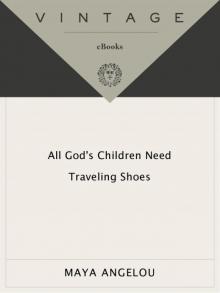 All God's Children Need Traveling Shoes
All God's Children Need Traveling Shoes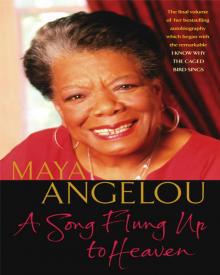 A Song Flung Up to Heaven
A Song Flung Up to Heaven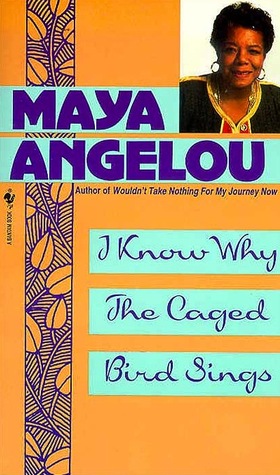 I Know Why the Caged Bird Sings
I Know Why the Caged Bird Sings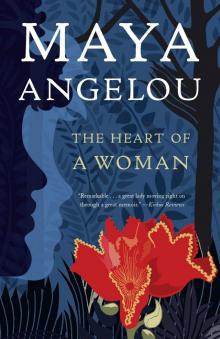 The Heart of a Woman
The Heart of a Woman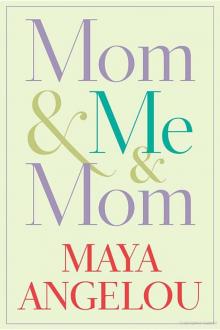 Mom & Me & Mom
Mom & Me & Mom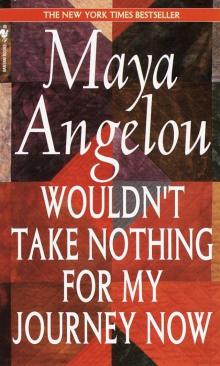 Wouldn't Take Nothing for My Journey Now
Wouldn't Take Nothing for My Journey Now Singin' and Swingin' and Gettin' Merry Like Christmas
Singin' and Swingin' and Gettin' Merry Like Christmas Just Give Me a Cool Drink of Water 'Fore I Diiie
Just Give Me a Cool Drink of Water 'Fore I Diiie The Collected Autobiographies of Maya Angelou
The Collected Autobiographies of Maya Angelou Letter to My Daughter
Letter to My Daughter Celebrations: Rituals of Peace and Prayer
Celebrations: Rituals of Peace and Prayer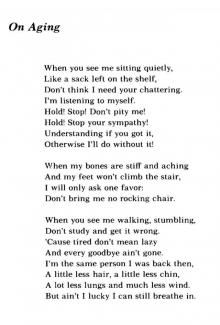 The Complete Collected Poems
The Complete Collected Poems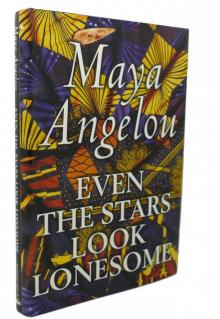 Even the Stars Look Lonesome
Even the Stars Look Lonesome Hallelujah! The Welcome Table: A Lifetime of Memories With Recipes
Hallelujah! The Welcome Table: A Lifetime of Memories With Recipes The Complete Collected Poems of Maya Angelou
The Complete Collected Poems of Maya Angelou Celebrations
Celebrations